Marketing Research Report: Country of Origin and Ethnocentrism
VerifiedAdded on 2020/05/16
|9
|1597
|116
Report
AI Summary
This report presents a marketing research study investigating the effects of country of origin and consumer ethnocentrism on brand attitude and purchase decision-making. The study employs a mixed-methods approach, utilizing a positivist research philosophy and a deductive research approach. The research design is descriptive, focusing on data collection through questionnaires and interview guides. The report details the research methodology, including ethical considerations, data collection and analysis techniques, and relevant references. The study aims to understand how consumers' perceptions of a product's country of origin and their ethnocentric tendencies influence their brand preferences and purchasing behavior, particularly in the context of global markets and the impact of consumer preferences on the domestic market.
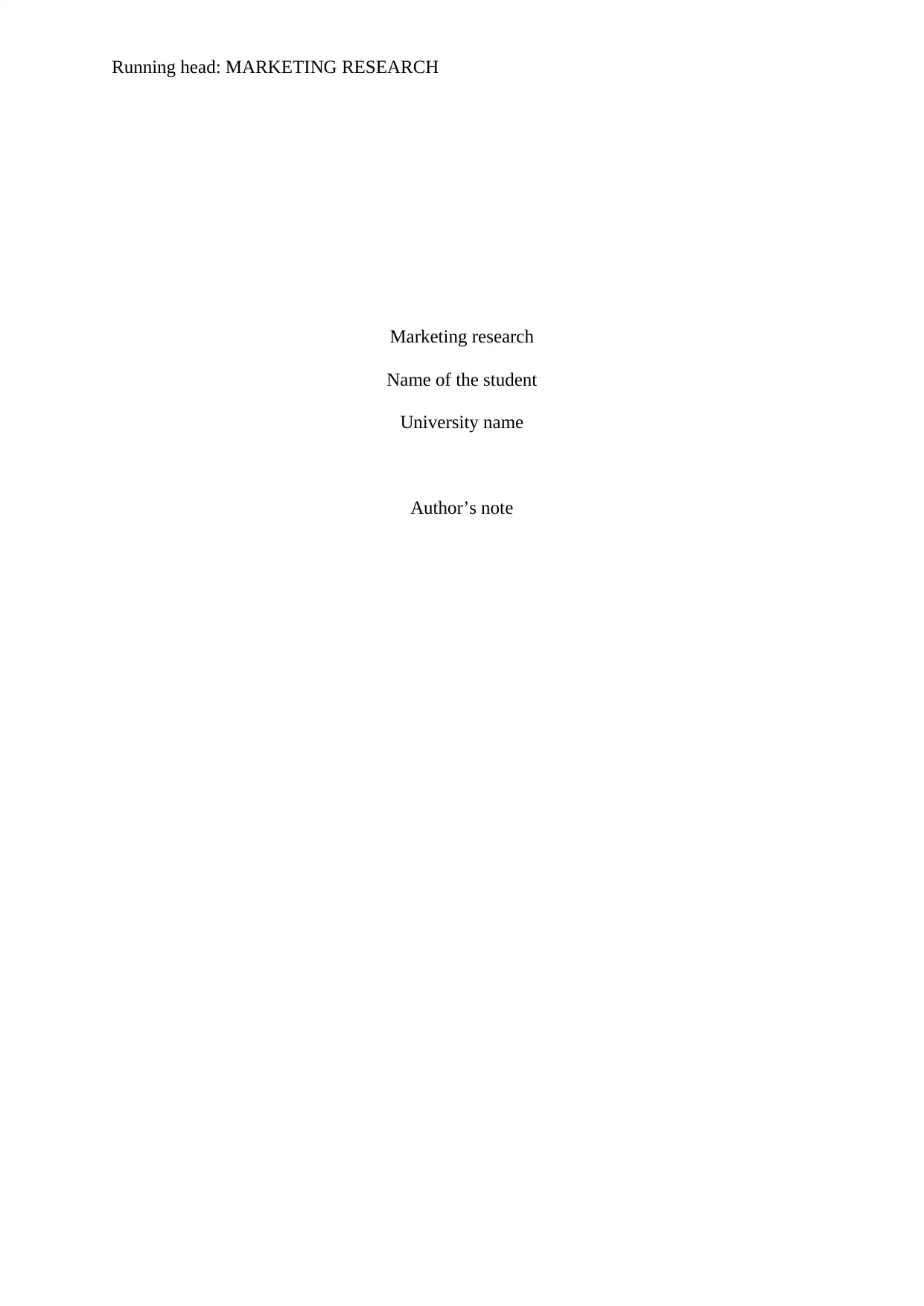
Running head: MARKETING RESEARCH
Marketing research
Name of the student
University name
Author’s note
Marketing research
Name of the student
University name
Author’s note
Paraphrase This Document
Need a fresh take? Get an instant paraphrase of this document with our AI Paraphraser
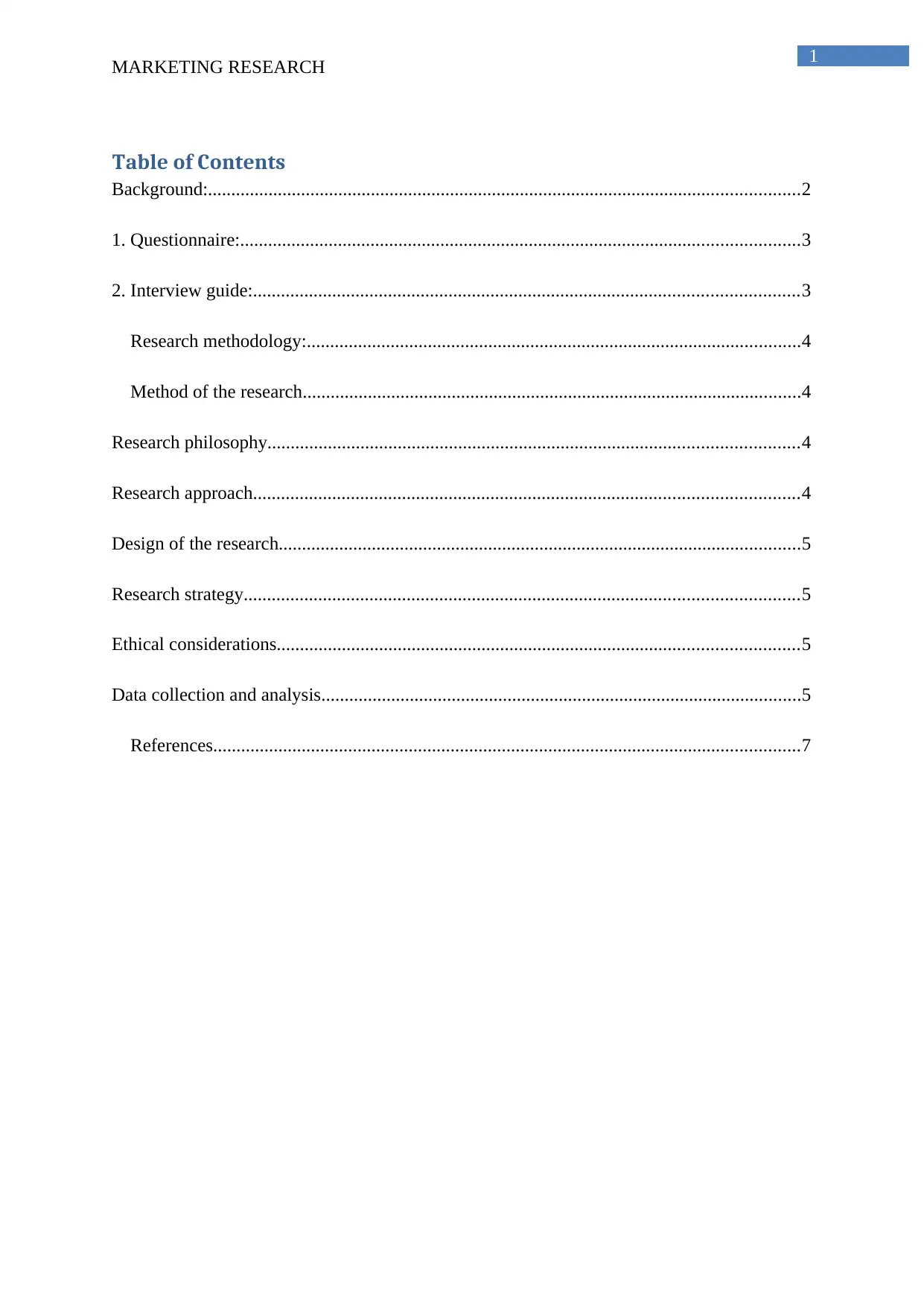
1
MARKETING RESEARCH
Table of Contents
Background:...............................................................................................................................2
1. Questionnaire:........................................................................................................................3
2. Interview guide:.....................................................................................................................3
Research methodology:..........................................................................................................4
Method of the research...........................................................................................................4
Research philosophy..................................................................................................................4
Research approach.....................................................................................................................4
Design of the research................................................................................................................5
Research strategy.......................................................................................................................5
Ethical considerations................................................................................................................5
Data collection and analysis.......................................................................................................5
References..............................................................................................................................7
MARKETING RESEARCH
Table of Contents
Background:...............................................................................................................................2
1. Questionnaire:........................................................................................................................3
2. Interview guide:.....................................................................................................................3
Research methodology:..........................................................................................................4
Method of the research...........................................................................................................4
Research philosophy..................................................................................................................4
Research approach.....................................................................................................................4
Design of the research................................................................................................................5
Research strategy.......................................................................................................................5
Ethical considerations................................................................................................................5
Data collection and analysis.......................................................................................................5
References..............................................................................................................................7
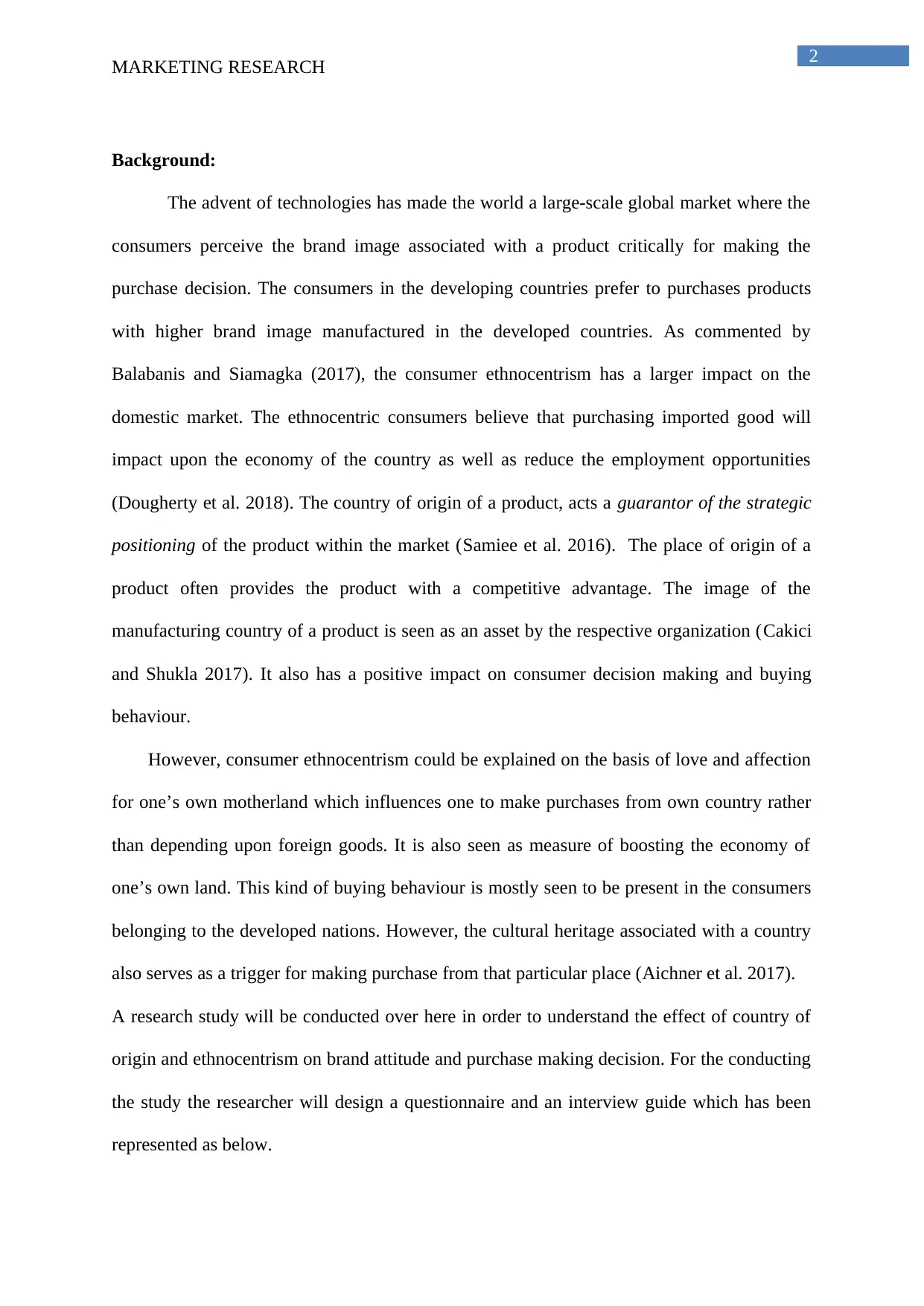
2
MARKETING RESEARCH
Background:
The advent of technologies has made the world a large-scale global market where the
consumers perceive the brand image associated with a product critically for making the
purchase decision. The consumers in the developing countries prefer to purchases products
with higher brand image manufactured in the developed countries. As commented by
Balabanis and Siamagka (2017), the consumer ethnocentrism has a larger impact on the
domestic market. The ethnocentric consumers believe that purchasing imported good will
impact upon the economy of the country as well as reduce the employment opportunities
(Dougherty et al. 2018). The country of origin of a product, acts a guarantor of the strategic
positioning of the product within the market (Samiee et al. 2016). The place of origin of a
product often provides the product with a competitive advantage. The image of the
manufacturing country of a product is seen as an asset by the respective organization (Cakici
and Shukla 2017). It also has a positive impact on consumer decision making and buying
behaviour.
However, consumer ethnocentrism could be explained on the basis of love and affection
for one’s own motherland which influences one to make purchases from own country rather
than depending upon foreign goods. It is also seen as measure of boosting the economy of
one’s own land. This kind of buying behaviour is mostly seen to be present in the consumers
belonging to the developed nations. However, the cultural heritage associated with a country
also serves as a trigger for making purchase from that particular place (Aichner et al. 2017).
A research study will be conducted over here in order to understand the effect of country of
origin and ethnocentrism on brand attitude and purchase making decision. For the conducting
the study the researcher will design a questionnaire and an interview guide which has been
represented as below.
MARKETING RESEARCH
Background:
The advent of technologies has made the world a large-scale global market where the
consumers perceive the brand image associated with a product critically for making the
purchase decision. The consumers in the developing countries prefer to purchases products
with higher brand image manufactured in the developed countries. As commented by
Balabanis and Siamagka (2017), the consumer ethnocentrism has a larger impact on the
domestic market. The ethnocentric consumers believe that purchasing imported good will
impact upon the economy of the country as well as reduce the employment opportunities
(Dougherty et al. 2018). The country of origin of a product, acts a guarantor of the strategic
positioning of the product within the market (Samiee et al. 2016). The place of origin of a
product often provides the product with a competitive advantage. The image of the
manufacturing country of a product is seen as an asset by the respective organization (Cakici
and Shukla 2017). It also has a positive impact on consumer decision making and buying
behaviour.
However, consumer ethnocentrism could be explained on the basis of love and affection
for one’s own motherland which influences one to make purchases from own country rather
than depending upon foreign goods. It is also seen as measure of boosting the economy of
one’s own land. This kind of buying behaviour is mostly seen to be present in the consumers
belonging to the developed nations. However, the cultural heritage associated with a country
also serves as a trigger for making purchase from that particular place (Aichner et al. 2017).
A research study will be conducted over here in order to understand the effect of country of
origin and ethnocentrism on brand attitude and purchase making decision. For the conducting
the study the researcher will design a questionnaire and an interview guide which has been
represented as below.
⊘ This is a preview!⊘
Do you want full access?
Subscribe today to unlock all pages.

Trusted by 1+ million students worldwide
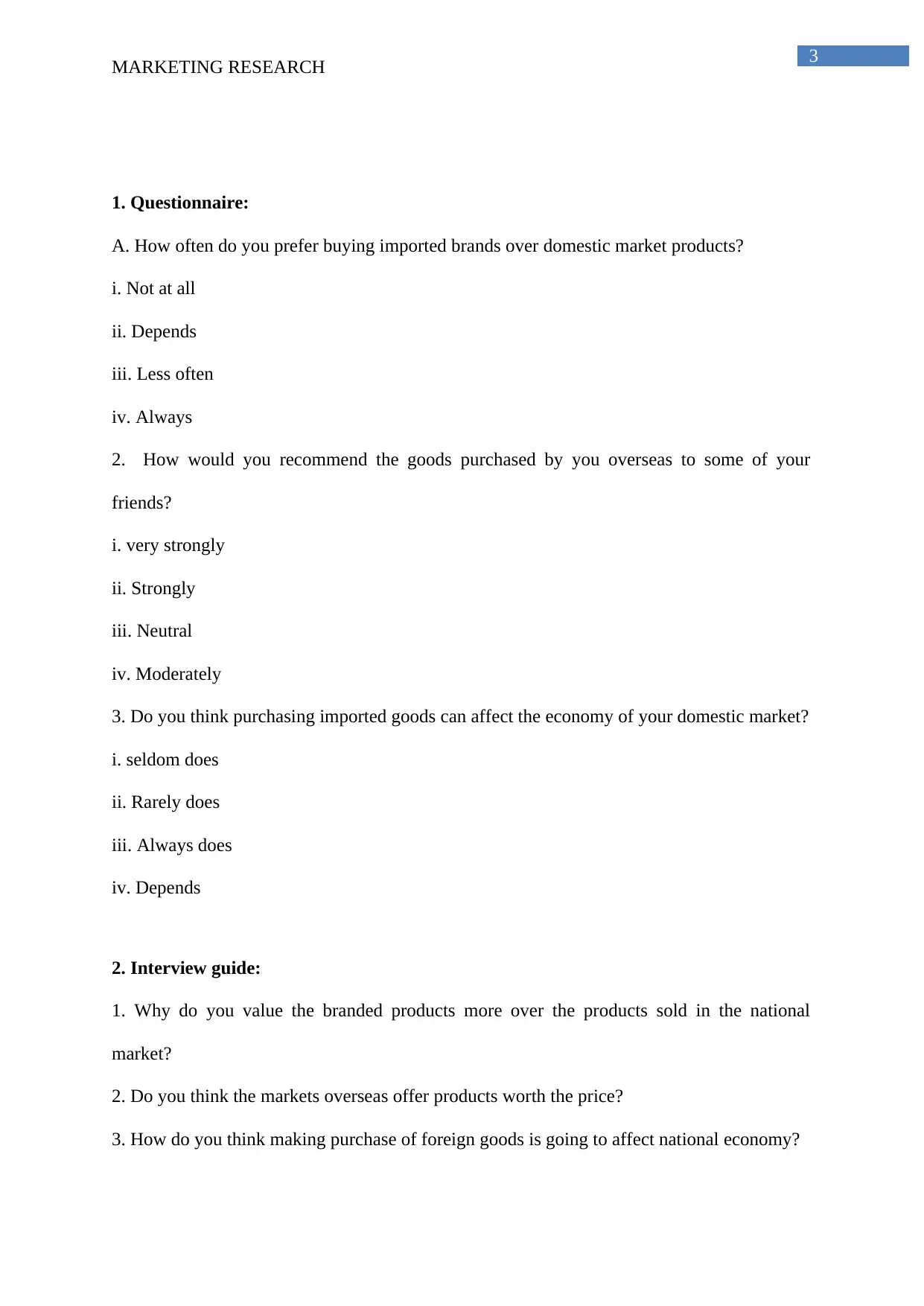
3
MARKETING RESEARCH
1. Questionnaire:
A. How often do you prefer buying imported brands over domestic market products?
i. Not at all
ii. Depends
iii. Less often
iv. Always
2. How would you recommend the goods purchased by you overseas to some of your
friends?
i. very strongly
ii. Strongly
iii. Neutral
iv. Moderately
3. Do you think purchasing imported goods can affect the economy of your domestic market?
i. seldom does
ii. Rarely does
iii. Always does
iv. Depends
2. Interview guide:
1. Why do you value the branded products more over the products sold in the national
market?
2. Do you think the markets overseas offer products worth the price?
3. How do you think making purchase of foreign goods is going to affect national economy?
MARKETING RESEARCH
1. Questionnaire:
A. How often do you prefer buying imported brands over domestic market products?
i. Not at all
ii. Depends
iii. Less often
iv. Always
2. How would you recommend the goods purchased by you overseas to some of your
friends?
i. very strongly
ii. Strongly
iii. Neutral
iv. Moderately
3. Do you think purchasing imported goods can affect the economy of your domestic market?
i. seldom does
ii. Rarely does
iii. Always does
iv. Depends
2. Interview guide:
1. Why do you value the branded products more over the products sold in the national
market?
2. Do you think the markets overseas offer products worth the price?
3. How do you think making purchase of foreign goods is going to affect national economy?
Paraphrase This Document
Need a fresh take? Get an instant paraphrase of this document with our AI Paraphraser
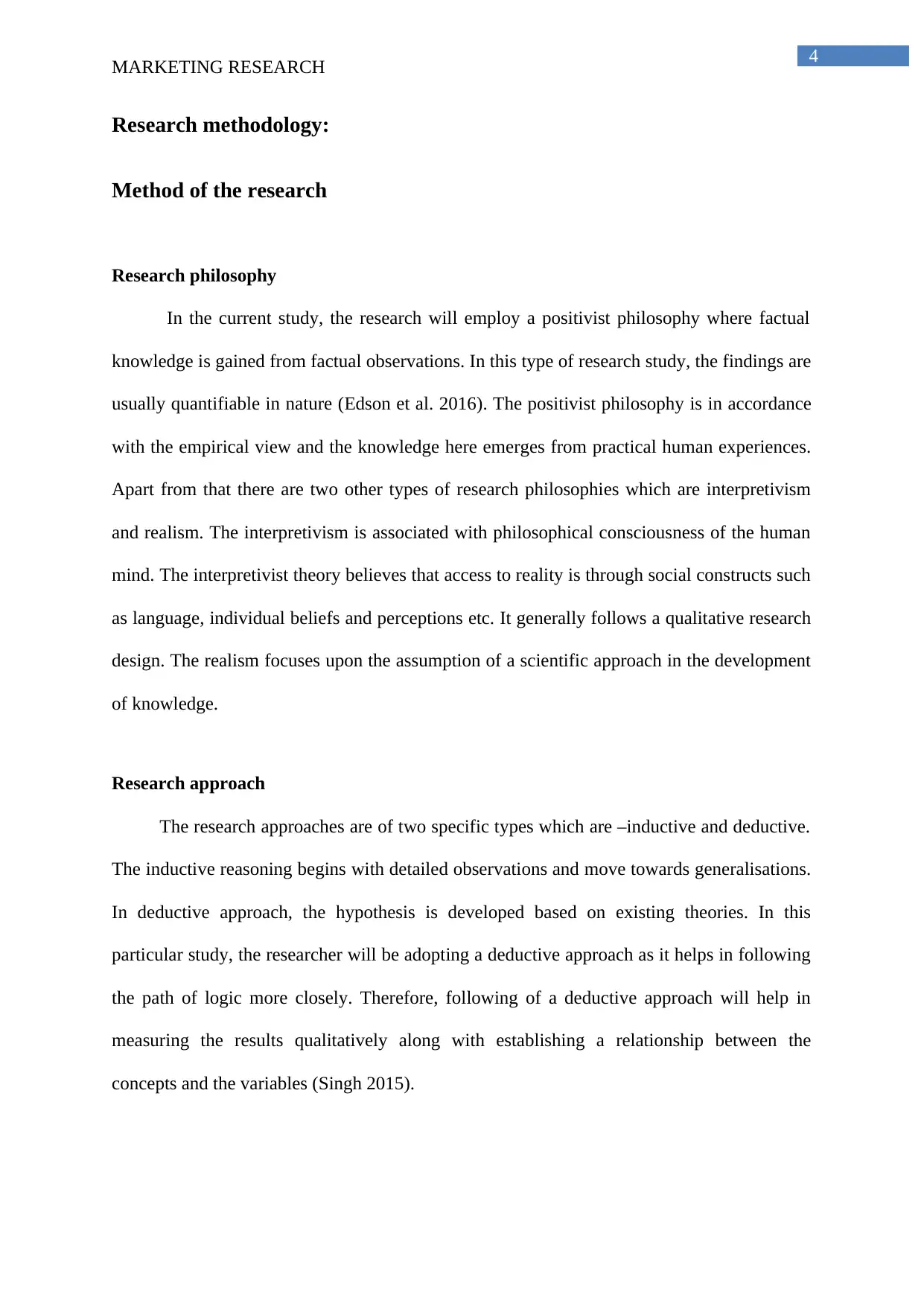
4
MARKETING RESEARCH
Research methodology:
Method of the research
Research philosophy
In the current study, the research will employ a positivist philosophy where factual
knowledge is gained from factual observations. In this type of research study, the findings are
usually quantifiable in nature (Edson et al. 2016). The positivist philosophy is in accordance
with the empirical view and the knowledge here emerges from practical human experiences.
Apart from that there are two other types of research philosophies which are interpretivism
and realism. The interpretivism is associated with philosophical consciousness of the human
mind. The interpretivist theory believes that access to reality is through social constructs such
as language, individual beliefs and perceptions etc. It generally follows a qualitative research
design. The realism focuses upon the assumption of a scientific approach in the development
of knowledge.
Research approach
The research approaches are of two specific types which are –inductive and deductive.
The inductive reasoning begins with detailed observations and move towards generalisations.
In deductive approach, the hypothesis is developed based on existing theories. In this
particular study, the researcher will be adopting a deductive approach as it helps in following
the path of logic more closely. Therefore, following of a deductive approach will help in
measuring the results qualitatively along with establishing a relationship between the
concepts and the variables (Singh 2015).
MARKETING RESEARCH
Research methodology:
Method of the research
Research philosophy
In the current study, the research will employ a positivist philosophy where factual
knowledge is gained from factual observations. In this type of research study, the findings are
usually quantifiable in nature (Edson et al. 2016). The positivist philosophy is in accordance
with the empirical view and the knowledge here emerges from practical human experiences.
Apart from that there are two other types of research philosophies which are interpretivism
and realism. The interpretivism is associated with philosophical consciousness of the human
mind. The interpretivist theory believes that access to reality is through social constructs such
as language, individual beliefs and perceptions etc. It generally follows a qualitative research
design. The realism focuses upon the assumption of a scientific approach in the development
of knowledge.
Research approach
The research approaches are of two specific types which are –inductive and deductive.
The inductive reasoning begins with detailed observations and move towards generalisations.
In deductive approach, the hypothesis is developed based on existing theories. In this
particular study, the researcher will be adopting a deductive approach as it helps in following
the path of logic more closely. Therefore, following of a deductive approach will help in
measuring the results qualitatively along with establishing a relationship between the
concepts and the variables (Singh 2015).
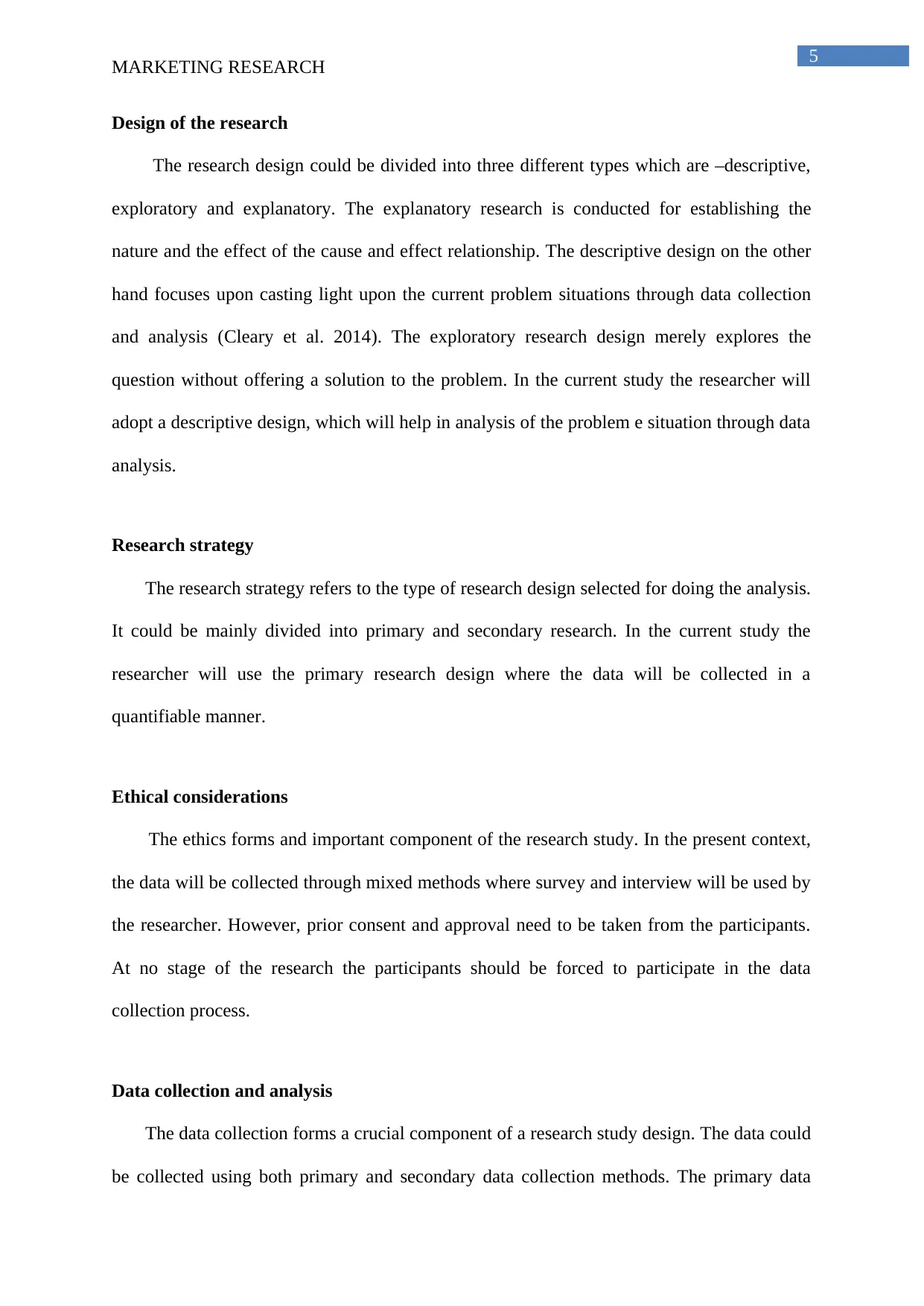
5
MARKETING RESEARCH
Design of the research
The research design could be divided into three different types which are –descriptive,
exploratory and explanatory. The explanatory research is conducted for establishing the
nature and the effect of the cause and effect relationship. The descriptive design on the other
hand focuses upon casting light upon the current problem situations through data collection
and analysis (Cleary et al. 2014). The exploratory research design merely explores the
question without offering a solution to the problem. In the current study the researcher will
adopt a descriptive design, which will help in analysis of the problem e situation through data
analysis.
Research strategy
The research strategy refers to the type of research design selected for doing the analysis.
It could be mainly divided into primary and secondary research. In the current study the
researcher will use the primary research design where the data will be collected in a
quantifiable manner.
Ethical considerations
The ethics forms and important component of the research study. In the present context,
the data will be collected through mixed methods where survey and interview will be used by
the researcher. However, prior consent and approval need to be taken from the participants.
At no stage of the research the participants should be forced to participate in the data
collection process.
Data collection and analysis
The data collection forms a crucial component of a research study design. The data could
be collected using both primary and secondary data collection methods. The primary data
MARKETING RESEARCH
Design of the research
The research design could be divided into three different types which are –descriptive,
exploratory and explanatory. The explanatory research is conducted for establishing the
nature and the effect of the cause and effect relationship. The descriptive design on the other
hand focuses upon casting light upon the current problem situations through data collection
and analysis (Cleary et al. 2014). The exploratory research design merely explores the
question without offering a solution to the problem. In the current study the researcher will
adopt a descriptive design, which will help in analysis of the problem e situation through data
analysis.
Research strategy
The research strategy refers to the type of research design selected for doing the analysis.
It could be mainly divided into primary and secondary research. In the current study the
researcher will use the primary research design where the data will be collected in a
quantifiable manner.
Ethical considerations
The ethics forms and important component of the research study. In the present context,
the data will be collected through mixed methods where survey and interview will be used by
the researcher. However, prior consent and approval need to be taken from the participants.
At no stage of the research the participants should be forced to participate in the data
collection process.
Data collection and analysis
The data collection forms a crucial component of a research study design. The data could
be collected using both primary and secondary data collection methods. The primary data
⊘ This is a preview!⊘
Do you want full access?
Subscribe today to unlock all pages.

Trusted by 1+ million students worldwide
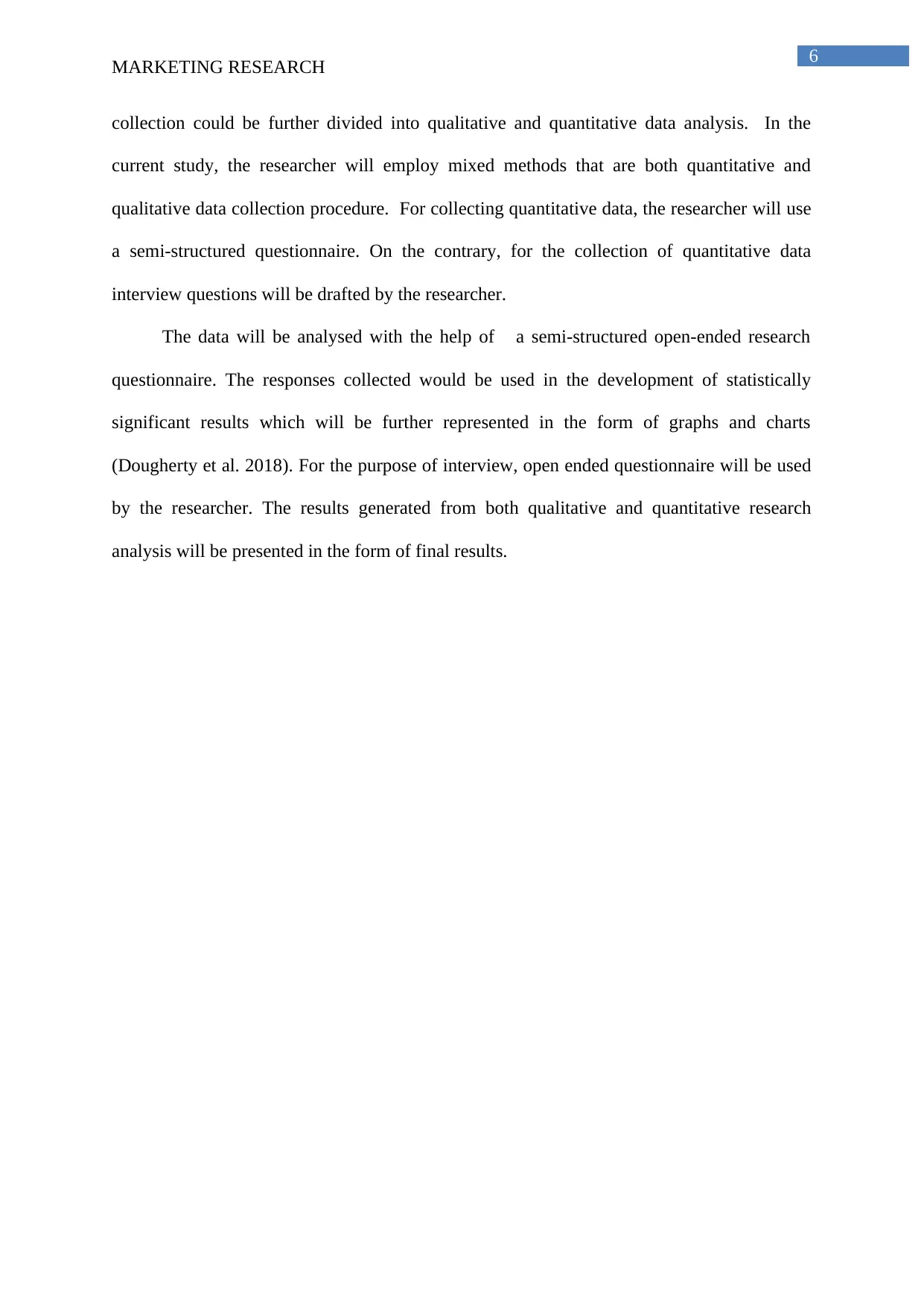
6
MARKETING RESEARCH
collection could be further divided into qualitative and quantitative data analysis. In the
current study, the researcher will employ mixed methods that are both quantitative and
qualitative data collection procedure. For collecting quantitative data, the researcher will use
a semi-structured questionnaire. On the contrary, for the collection of quantitative data
interview questions will be drafted by the researcher.
The data will be analysed with the help of a semi-structured open-ended research
questionnaire. The responses collected would be used in the development of statistically
significant results which will be further represented in the form of graphs and charts
(Dougherty et al. 2018). For the purpose of interview, open ended questionnaire will be used
by the researcher. The results generated from both qualitative and quantitative research
analysis will be presented in the form of final results.
MARKETING RESEARCH
collection could be further divided into qualitative and quantitative data analysis. In the
current study, the researcher will employ mixed methods that are both quantitative and
qualitative data collection procedure. For collecting quantitative data, the researcher will use
a semi-structured questionnaire. On the contrary, for the collection of quantitative data
interview questions will be drafted by the researcher.
The data will be analysed with the help of a semi-structured open-ended research
questionnaire. The responses collected would be used in the development of statistically
significant results which will be further represented in the form of graphs and charts
(Dougherty et al. 2018). For the purpose of interview, open ended questionnaire will be used
by the researcher. The results generated from both qualitative and quantitative research
analysis will be presented in the form of final results.
Paraphrase This Document
Need a fresh take? Get an instant paraphrase of this document with our AI Paraphraser
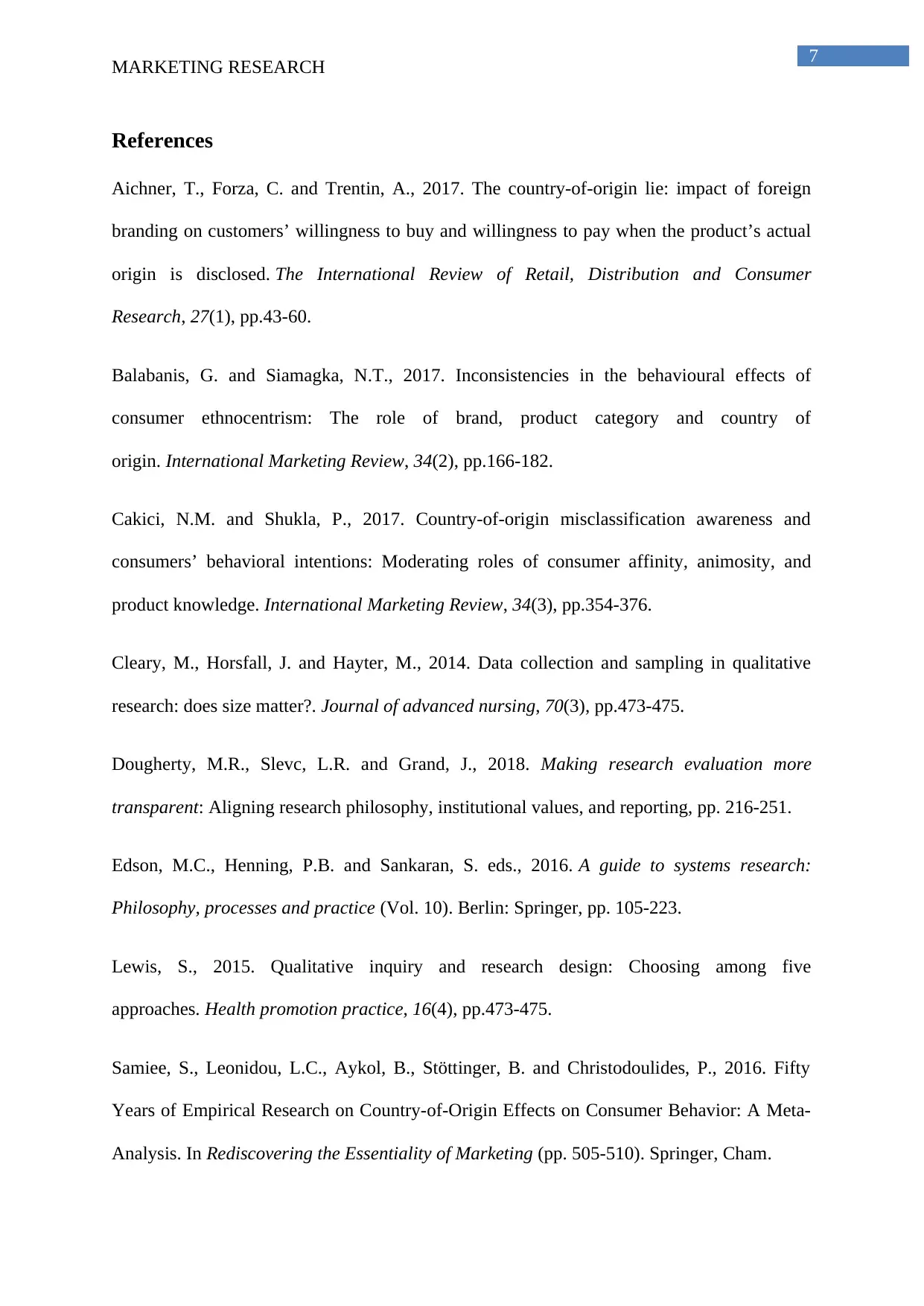
7
MARKETING RESEARCH
References
Aichner, T., Forza, C. and Trentin, A., 2017. The country-of-origin lie: impact of foreign
branding on customers’ willingness to buy and willingness to pay when the product’s actual
origin is disclosed. The International Review of Retail, Distribution and Consumer
Research, 27(1), pp.43-60.
Balabanis, G. and Siamagka, N.T., 2017. Inconsistencies in the behavioural effects of
consumer ethnocentrism: The role of brand, product category and country of
origin. International Marketing Review, 34(2), pp.166-182.
Cakici, N.M. and Shukla, P., 2017. Country-of-origin misclassification awareness and
consumers’ behavioral intentions: Moderating roles of consumer affinity, animosity, and
product knowledge. International Marketing Review, 34(3), pp.354-376.
Cleary, M., Horsfall, J. and Hayter, M., 2014. Data collection and sampling in qualitative
research: does size matter?. Journal of advanced nursing, 70(3), pp.473-475.
Dougherty, M.R., Slevc, L.R. and Grand, J., 2018. Making research evaluation more
transparent: Aligning research philosophy, institutional values, and reporting, pp. 216-251.
Edson, M.C., Henning, P.B. and Sankaran, S. eds., 2016. A guide to systems research:
Philosophy, processes and practice (Vol. 10). Berlin: Springer, pp. 105-223.
Lewis, S., 2015. Qualitative inquiry and research design: Choosing among five
approaches. Health promotion practice, 16(4), pp.473-475.
Samiee, S., Leonidou, L.C., Aykol, B., Stöttinger, B. and Christodoulides, P., 2016. Fifty
Years of Empirical Research on Country-of-Origin Effects on Consumer Behavior: A Meta-
Analysis. In Rediscovering the Essentiality of Marketing (pp. 505-510). Springer, Cham.
MARKETING RESEARCH
References
Aichner, T., Forza, C. and Trentin, A., 2017. The country-of-origin lie: impact of foreign
branding on customers’ willingness to buy and willingness to pay when the product’s actual
origin is disclosed. The International Review of Retail, Distribution and Consumer
Research, 27(1), pp.43-60.
Balabanis, G. and Siamagka, N.T., 2017. Inconsistencies in the behavioural effects of
consumer ethnocentrism: The role of brand, product category and country of
origin. International Marketing Review, 34(2), pp.166-182.
Cakici, N.M. and Shukla, P., 2017. Country-of-origin misclassification awareness and
consumers’ behavioral intentions: Moderating roles of consumer affinity, animosity, and
product knowledge. International Marketing Review, 34(3), pp.354-376.
Cleary, M., Horsfall, J. and Hayter, M., 2014. Data collection and sampling in qualitative
research: does size matter?. Journal of advanced nursing, 70(3), pp.473-475.
Dougherty, M.R., Slevc, L.R. and Grand, J., 2018. Making research evaluation more
transparent: Aligning research philosophy, institutional values, and reporting, pp. 216-251.
Edson, M.C., Henning, P.B. and Sankaran, S. eds., 2016. A guide to systems research:
Philosophy, processes and practice (Vol. 10). Berlin: Springer, pp. 105-223.
Lewis, S., 2015. Qualitative inquiry and research design: Choosing among five
approaches. Health promotion practice, 16(4), pp.473-475.
Samiee, S., Leonidou, L.C., Aykol, B., Stöttinger, B. and Christodoulides, P., 2016. Fifty
Years of Empirical Research on Country-of-Origin Effects on Consumer Behavior: A Meta-
Analysis. In Rediscovering the Essentiality of Marketing (pp. 505-510). Springer, Cham.

8
MARKETING RESEARCH
Singh, K.D., 2015. Creating your own qualitative research approach: Selecting, integrating
and operationalizing philosophy, methodology and methods. Vision, 19(2), pp.132-146.
MARKETING RESEARCH
Singh, K.D., 2015. Creating your own qualitative research approach: Selecting, integrating
and operationalizing philosophy, methodology and methods. Vision, 19(2), pp.132-146.
⊘ This is a preview!⊘
Do you want full access?
Subscribe today to unlock all pages.

Trusted by 1+ million students worldwide
1 out of 9
Related Documents
Your All-in-One AI-Powered Toolkit for Academic Success.
+13062052269
info@desklib.com
Available 24*7 on WhatsApp / Email
![[object Object]](/_next/static/media/star-bottom.7253800d.svg)
Unlock your academic potential
Copyright © 2020–2025 A2Z Services. All Rights Reserved. Developed and managed by ZUCOL.





